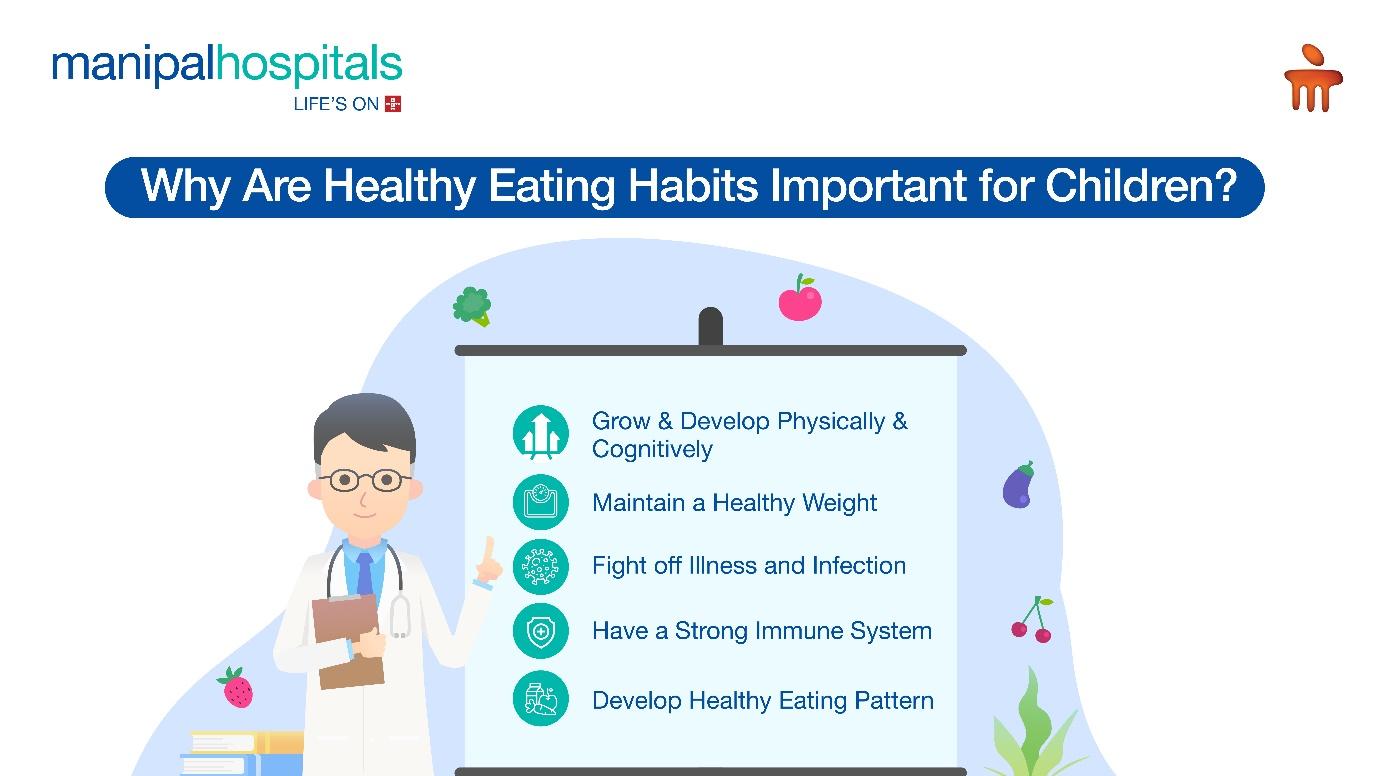
As parents, we all want to raise healthy and happy children. Inculcating healthy eating habits in our kids from a young age is crucial for their well-being. It sets the foundation for a lifetime of good health. However, for many parents, this journey can be a struggle, especially with picky eaters. This guide aims to break down the complexities of building nutritious eating habits in children. It will help you understand the practical strategies to help you excel in this essential parenting role.
Synopsis
Why Are Healthy Eating Habits Important for Children?

Right eating habits are the building blocks for a healthy body and mind. A balanced diet rich in fruits, vegetables, whole grains, and lean protein provides children with the essential vitamins, minerals, and nutrients they need to:
-
Grow and develop physically and cognitively
-
Maintain a healthy weight
-
Fight off illness and infection
-
Have a strong immune system
- Develop healthy eating patterns that will last a lifetime
Consult our paediatrician in Mangalore if you need to learn more about healthy food habits.
Common Challenges Faced by Parents
Building healthy food habits in children comes with its set of challenges. Here are some of the most common ones that parents encounter:
-
Picky Eating: Many young children are naturally cautious about trying new foods.
-
Sugar Cravings: Sugary drinks and processed snacks are often readily available and highly appealing to kids.
-
Distractions During Meals: Television, tablets, and phones can distract children from focusing on eating and enjoying their food.
-
Unstructured Mealtimes: Inconsistent schedules can lead to unhealthy snacking habits and missed meals.
Consult our paediatric hospital in Mangalore if you need to learn more about healthy eating habits.
10 Strategies to Nurture Healthy Eating Habits in Your Child
These strategies can help you create a positive and nurturing environment that encourages your child to develop a healthy relationship with food:
1. Schedule Meals and Snacks
Create a regular eating routine that includes three meals and 2-3 healthy snacks throughout the day. This keeps blood sugar levels stable and prevents unhealthy snacking.
2. Offer Nutritious Meals
Focus on offering balanced meals with a variety of colourful fruits and vegetables, whole grains, lean protein sources, and healthy fats.
3. Encourage Slow Eating
Mindful eating allows children to recognize hunger and fullness cues, preventing overeating. Encourage them to chew their food thoroughly and savour each bite.
4. Limit Sugary and Junk Foods
Restrict sugary drinks, processed snacks, and fast food. Occasional treats are okay, but avoid making them a regular part of your child's diet.
5. Hydration is Key
Encourage your child to drink plenty of water throughout the day. This keeps them feeling full and energized.
6. Start Early and Be Consistent
The earlier you introduce healthy eating habits, the more likely they are to become ingrained in your child's routine. Consistency is key, so stick to your established meal and snack schedules.
7. Food is Not a Reward or Punishment
Using food to bribe or punish your child can create unhealthy associations with food. Focus on positive reinforcement and praise their efforts to try new foods.
8. Encourage Self-Regulation
As children get older, involve them in meal planning and preparation. Allow them to choose from a selection of healthy options, fostering a sense of ownership over their food choices.
9. Educate on the Benefits
Talk to your children about the importance of healthy eating for their energy levels, growth, and overall health. Use age-appropriate language and connect healthy eating to activities they enjoy (e.g., strong muscles for playing sports).
10. Limit Screen Time While Eating
Turn off electronics during mealtimes. This encourages focused eating, allows for family conversation, and creates a positive dining experience.
Conclusion
Our children get lifelong benefits by developing nurturing eating habits that help to shape their future health and well-being. We can lay the foundation for lifelong habits by implementing these strategies and approaching mealtimes with patience and consistency. While it can be a little difficult to manage and inculcate healthy habits in children, you don’t have to do it all alone. KMC Hospital Mangalore’s paediatric department is ready to provide optimal guidance and assistance.
FAQs
FAQ's
Be patient and persistent, children often refuse food for the first eight times, but this doesn't mean they don't like it. Offer new foods repeatedly, alongside familiar favourites. Make mealtimes fun and engaging. Involve your child in the grocery shopping or meal preparation process to spark their curiosity about new ingredients.
Occasional treats are fine, but avoid using dessert as a reward for finishing dinner. This can make children focus more on getting the dessert than on enjoying a balanced meal. Offer fruits or a small portion of yoghurt as a healthier dessert option.
Patience is key when dealing with selective eating habits. Offer vegetables in different forms of dishes and lead by example by incorporating them into your meals.





















 4 Min Read
4 Min Read




















